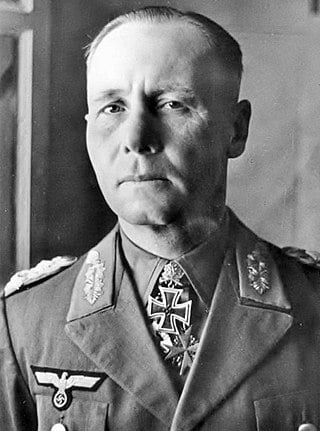
Erwin Rommel
Johannes Erwin Eugen Rommel (pronounced [ˈɛʁviːn ˈʁɔməl] (listen)) (15 November 1891 – 14 October 1944) was a German general during World War II. Popularly known as the Desert Fox (German: Wüstenfuchs, pronounced [ˈvyːstn̩ˌfʊks] (listen)), he served as field marshal in the Wehrmacht (armed forces) of Nazi Germany, as well as serving in the Reichswehr of the Weimar Republic, and the army of Imperial Germany.
Rommel was a highly decorated officer in World War I and was awarded the Pour le Mérite for his actions on the Italian Front. In 1937, he published his classic book on military tactics, Infantry Attacks, drawing on his experiences in that war. In World War II, he commanded the 7th Panzer Division during the 1940 invasion of France. His leadership of German and Italian forces in the North African campaign established his reputation as one of the ablest tank commanders of the war, and earned him the nickname der Wüstenfuchs, “the Desert Fox”. Among his British adversaries he had a reputation for chivalry, and his phrase “war without hate” has been uncritically used to describe the North African campaign. A number of historians have since rejected the phrase as myth and uncovered numerous examples of war crimes and abuses towards both enemy soldiers and native populations in Africa during the conflict. Other historians note that there is no clear evidence Rommel was involved or aware of these crimes, with some pointing out that the war in the desert, as fought by Rommel and his opponents, still came as close to a clean fight as there was in World War II. He later commanded the German forces opposing the Allied cross-channel invasion of Normandy in June 1944.
With the Nazis gaining power in Germany, Rommel gradually came to accept the new regime, with historians giving different accounts on the specific period and his motivations. He was a supporter of Adolf Hitler, at least until near the end of the war, if not necessarily sympathetic to the party and the paramilitary forces associated with it. In 1944, Rommel was implicated in the 20 July plot to assassinate Hitler. Because of Rommel’s status as a national hero, Hitler desired to eliminate him quietly instead of immediately executing him, as many other plotters were. Rommel was given a choice between committing suicide, in return for assurances that his reputation would remain intact and that his family would not be persecuted following his death, or facing a trial that would result in his disgrace and execution; he chose the former and committed suicide using a cyanide pill. Rommel was given a state funeral, and it was announced that he had succumbed to his injuries from the strafing of his staff car in Normandy.
Rommel has become a larger-than-life figure in both Allied and Nazi propaganda, and in postwar popular culture, with numerous authors considering him an apolitical, brilliant commander and a victim of Nazi Germany, although this assessment is contested by other authors as the Rommel myth. Rommel’s reputation for conducting a clean war was used in the interest of the West German rearmament and reconciliation between the former enemies – the United Kingdom and the United States on one side and the new Federal Republic of Germany on the other. Several of Rommel’s former subordinates, notably his chief of staff Hans Speidel, played key roles in German rearmament and integration into NATO in the postwar era. The German Army’s largest military base, the Field Marshal Rommel Barracks, Augustdorf, is named in his honour. The longtime mayor of Stuttgart, Germany and namesake of Stuttgart Airport, Manfred Rommel, was his son.

